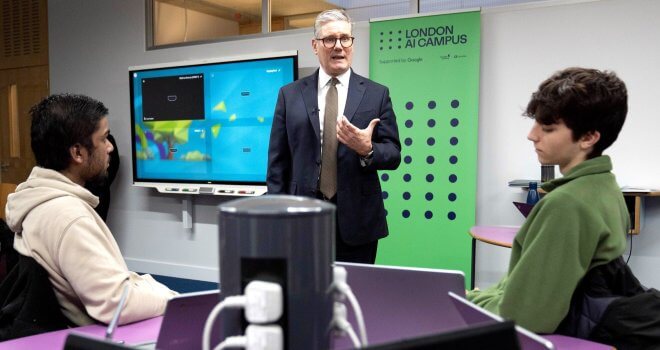Project Management Trends For 2023

Currently, 2.13 million people are working in the project management sector in the UK, but by 2027 it’s estimated we’ll need 87.7 million to meet demand.
This year has been one of big changes for the sector as businesses tackled returning to the office and embraced a new age of hybrid working, which increased the need for flexibility and remote access for project managers and their team members.
So, what can we expect from the project management industry in 2023?
A Shift Towards AI
With automation set to replace 80 percent of manual project management tasks by 2030, it’s time to embrace artificial intelligence (AI).
Project managers willing to roll out automation across time-consuming tasks and work alongside AI will reap the rewards – freeing up the time to spend on high-value tasks.
For example, one way we may see businesses streamlining project management tasks is through combining corporate messaging platforms with machine learning chatbot technologies. The technology recognises assignments and appointments in text and automates the collection of feedback, deadlines and other important communications.
These can be collated into a single spreadsheet or even directly linked to emails and calendars to save managers time on manual tasks such as updating notes and creating calendars for each team member.
As a result, their time is spent on high-value tasks such as responding to employee or client challenges and reviewing processes to make sure every team member has what they need to perform their role effectively.
Over time this automation framework can be extended to cover a wider range of tasks and challenges to make each project more efficient – saving time and money and improving projects by freeing up more time to be spent on the areas of the project that deliver the most value.
Adaptability and Emotional Intelligence
Technology is not the only way in which we expect project managers to disrupt and improve their offerings over the next year. By focusing on the emotional needs of their teams, managers can increase productivity by reducing presenteeism and absenteeism and retaining their brightest talent.
As a result, we expect to see managers improving their emotional intelligence to spot key challenges facing team members and feel confident in supporting them.
However, there is no one-size-fits-all solution to employees’ emotional challenges, so managers may have to focus on developing flexible offerings that can be adapted to suit individual needs.
For example, creating a psychologically safe environment in which individuals feel comfortable asking challenging questions without fear of being criticised or having their words taken out of context can be invaluable. This allows project managers to receive feedback that shapes both their management approach and project frameworks to better reflect the working styles of their team members.
This culture of authenticity and transparency is only possible within a team that values inclusion and has a track record of embracing diverse voices. Managers can amplify this by encouraging team members to widen their pool of influences to understand, tolerate and embed differing viewpoints within their workload and strategies.
Not only does this result in more efficient collaboration and output but this culture of openness and actioning feedback is also valued by employers and colleagues alike – with communication, motivation and adaptability skills among the top ten desirable traits in a project manager.
Embracing Change Management
The last few years of disruption have made the workforce more resilient and adaptable to change – and in the next 12 months, we expect to see these new skills reflected in project management.
While increasing flexibility in working approaches has brought many benefits – in a greater work-life balance and reduced stress – it has its downsides. Among these is the potential disruption caused by different working patterns and challenges in communication and collaboration.
This is why change management is more important than ever for project managers. Those proficient in this skill can navigate challenges that threaten to deviate teams from their project plan and workload – minimising disruption, pivoting strategies and delivering projects successfully despite distractions.
Effective change management requires several skills. Managers must be able to measure and analyse projects, collecting the data needed to make quick and considered decisions. They must also be able to clearly communicate pivots and motivate their team to carry out new instructions or strategies.
Managers can hone these skills by reviewing change management performance and assessing what worked well and any areas of improvement. By welcoming feedback from the team, it is also possible to refine future processes to make them more efficient.
By successfully navigating changes within projects, teams can build the skills and confidence to approach any challenge, allowing businesses to continue offering the flexible working opportunities that improve team morale and employee satisfaction without taking away from productivity or performance.
Say Hello to Project Influencers
Despite industry claims that the traditional project manager role is diminishing, it is actually evolving – and will continue to over the next year.
This is because the workplace is changing. Careers are no longer a means to an end, with employees working long hours for a paycheque. Modern employees value human relationships, flexibility and workplace culture.
Enter the ‘project influencer’. Modern project managers cannot only be adept at traditional administrative skills like time and budget management, scheduling and reporting. They are also expected to add human ‘soft’ skills to the traditional portfolio to lead and retain modern talent.
These should be the focus of conscientious project managers, who should be aware of their newfound status and take time to practice the skills that allow them to not only excel in their role but lead by example. These skills include the ability to build human relationships, understand the motivations of their team and use logic and critical thinking to propose solutions to emerging problems.
Project influencers don’t just answer to stakeholders, they answer to their team – fuelling employee satisfaction and career development by nurturing a workforce that caters to the needs and preferences of its individuals.
The result is a positive and productive workplace in which every employee feels valued and performs tasks to the best of their ability. Across the company, this yields high-value projects that reflect the talents and strengths of individuals, while tying in the collaborative principles that allow them to be delivered on time and to the highest standards.
Galen Low is General Manager at The Digital Project Manager





